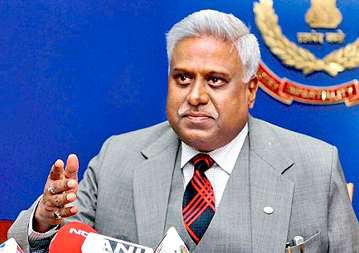
Sinha flatly denied any wrongdoing and termed fake the visitors’ register submitted in the Supreme Court by lawyer Prashant Bhushan, who approached the apex court seeking removal of Sinha from monitoring the 2G case. The veracity of the visitors’ diary could not be independently verified.
The diary purportedly contains the names of Anil Ambani’s aides Tony Jesudasan and A N Sethuraman, and meat exporter Moin Qureshi. Reliance Anil Dhirubhai Ambani Group (RADAG) is an accused in the 2G scam case, while Qureshi is under the scanner of the Income Tax Department.
“The register (submitted by Bhushan) is fake, I have two registers that are maintained by the police,” Sinha was quoted as saying by a TV channel. Sinha also said he had met Reliance officials. “But have I shown favour to anyone?” he asked.
The CBI had, on Tuesday, issued a statement denying any illegal conduct by its director. The Supreme Court will examine the “diary” and its contents on Thursday.
The Aam Aadmi Party, in which Bhushan is a senior functionary, demanded the immediate suspension of Sinha for compromising the agency’s impartiality through his unbecoming behaviour of “holding secret meetings”.
“The diary contains several hundred pages in which there are several thousands of hand written entries. Now, for the director to deny the existence of such a diary shows (his) desperation to try and get time. This can be authenticated through a probe. It will not take more than five minutes. Just ask the guards who made the entries,” Bhushan said.
The issue snowballed into a controversy with a report on a newspaper’s website and Bhushan informing the Supreme Court that he has come across “disturbing and explosive” materials relating to Sinha’s frequent meetings with RADAG officials and other accused at his residence.
Sinha purportedly met two officials of RADAG 50 times in 15 months (between May 2013 and August 2014) at his official residence 2, Janpath, here. Sinha is already under fire from the Supreme Court in connection with the ongoing trial in the 2G scam case.
Two names are mentioned incompletely in the diary like Tony, Toni, Toni+Sir, Raman, Setu, Setu Raman and Toni+Setu. The registration numbers of the cars in which they arrived were also recorded.
Qureshi also visited Sinha on several occasions along with former director of CBI, A P Singh, now a member of the Union Public Service Commission. He visited Sinha at least 90 times in 15 months, the report claimed, adding that he seems to have been Sinha’s family friend.
Qureshi and wife were mentioned as Kureshi, Muin Kureshi, Kureshiji, Kureshi1, Kureshiwife, Kureshi (madam), written both in English and Hindi in the register.
Qureshi even sent his tailor and car to Sinha’s residence at times, the report claimed.





Comments
Add new comment